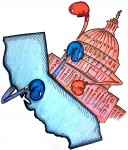California legislative leaders announced they will defend the state’s diversity, science and economic accomplishments after Donald Trump’s presidential election victory.
Senate President pro Tempore Kevin de Leon and Assembly Speaker Anthony Rendon called California a refuge of justice and opportunity for all people and an example for other states to follow.
“California was not a part of this nation when its history began, but we are clearly now the keeper of its future,” de Leon and Rendon said in their joint statement after the election.
One might expect such language from Democratic state lawmakers facing the first unified Republican federal government in almost 10 years, especially in the wake of Hillary Clinton’s defeat.
However, Zev Yaroslavsky, director of the Los Angeles Initiative at the UCLA Luskin School of Public Affairs, said he thinks potential policy disagreements between California and the federal government tend to fall on states’ rights arguments rather than traditional party-line conflicts.
“There were often differences of opinion between the state and federal governments,” Yaroslavsky said. “Sometimes they were major, sometimes they were on the margin, but it was all part of the federal and state relationship.”
Yaroslavsky pointed out that under the administration of Ronald Reagan, the federal government tried to promote offshore drilling along the coast of both California and Florida.
“It was something California had fought against since the Santa Barbara environmental catastrophe in the 1970s,” Yaroslavsky said. “We didn’t want the entire coastline of California, to be jeopardized by oil drilling, so when there was difference of opinion, the state used every trick at its disposal to try to delay action.”
He said environmental advocates filed lawsuits to prevent policy that would try to degrade the environment. He added similar efforts took place in Florida, although he thought the Republican administration was more responsive to Floridian concerns.
Ben Allen, state senator for the 26th district, which includes UCLA, said as co-chair of the California Environmental Legislative Caucus, he is concerned about some of the statements Trump and his nominees for environmental regulatory agencies have made.
“We want to push back against any attempt to limit California’s environmental protections,” Allen said. “However, we still want to work with the federal (Environmental Protection Agency) on climate change, pollution controls, greenhouse gas controls, sustainable forestry, sustainable agriculture and the like.”
Allen added past presidents’ administrations have typically given California leeway to set its own environmental regulations.
“There has been a long-standing bipartisan precedent for federal administration environmental policy regulators to allow California to go ahead of the rest of the country,” Allen said. “The only question is, ‘Will Trump continue that tradition?’”
Trump’s nominee to head the EPA, Scott Pruitt, said he could not commit to allowing California to set stricter car emissions standards during his confirmation hearing Wednesday.
Other lawmakers said they wanted to focus on societal issues.
Sebastian Ridley-Thomas, assembly member for the 54th district, which includes UCLA, said with Trump in the White House, he wants to work to reduce the homeless population.
“Homelessness is a societal issue that requires a multifaceted approach led by government towards a solution,” Ridley-Thomas said. “With more than 119,000 people finding themselves without shelter on any given night, we are in a good position to make homeless relief a priority.”
He added he sees the repeal of the Affordable Care Act as a contentious issue between state and federal officials.
“We are working tirelessly to mitigate the impacts of a repeal of the Affordable Care Act,” Ridley-Thomas said.
Though most recent statements from Democratic California lawmakers have been defiant, some still see possible areas for cooperation between the state and a Republican Congress and White House.
Allen pointed to infrastructure and transportation.
“The mayor of Los Angeles has been in contact with federal officials to talk about increased transportation funding,” Allen said. “Especially in the context of (the Los Angeles 2024) Olympics bid, hopefully we can get the subway out to Westwood in time for the games.”
Ridley-Thomas said as the chair of the Assembly Committee on Revenue and Taxation, he hopes to work with the federal government on tax reform.
“Over $2.1 trillion are being held in offshore accounts by some of the largest corporations in the country,” Ridley-Thomas said. “Conversations in Washington about the repatriation of foreign earnings are important to California, given the considerable corporate footprint of our state.
Allen also said he does not think Trump will try to link cooperation on issues like transportation and infrastructure to more contentious ones like immigration policy or environmental regulations.
“Trump could play real hardball, but he has to understand California is one-fifth of the nation’s economy on its own,” Allen said. “Sending California into an economic tailspin is not in the nation’s interest.”
He added he thinks California’s progressive measures, Democratic supermajorities in the state legislature and overwhelming support for Hillary Clinton prove California voters repudiated much of what Trump stood for on the campaign trail.
“We have a different model (from most of the country), where we put in place strong environmental protections, worker protections and still grow strong economy where people want to be,” Allen said. “It’s not about dropping to the lowest common denominator and selling people short, it’s about embracing diversity.”
Ridley-Thomas said he thinks the state must represent to the rest of the country that economic success and an empowered workforce can coexist.
“Labor laws and economic growth are not mutually exclusive,” Ridley-Thomas said.
—
Read more Daily Bruin coverage of the presidential inauguration, along with analysis of California and federal policy under the Trump Administration:

